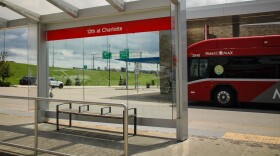-
Constant fights over bus funding have meant service cuts and long wait times for riders. Now, dozens of riders are launching a union, and they hope others join to make service better for everyone.
-
At his State of the City address, Mayor Quinton Lucas detailed his priorities for the end of his term and previewed the city’s budget for the next fiscal year, which will see cuts or stagnation in most departments but a major increase in police funding.
-
The Kansas City Area Transportation Authority will charge for bus rides starting in June. The $2 fare can be paid through an app, credit or debit card, or reloadable fare cards.
-
The Kansas City metro is under a winter storm warning. It's expected to see snow and bitterly cold temperatures starting Friday evening, which will affect city services and people’s ability to drive. Missouri's governor has issued a state of emergency.
-
Around 80% of bus stops across the metro do not have somewhere for riders to sit. Even fewer have a shelter. An interactive map from KCUR shows where to find amenities at each bus stop in the metro, and what the area transit agencies are doing to add more.
-
2025 brought a lot of grief for governments in Kansas City, Missouri, and Jackson County: the expensive departure of the city's highest-paid official, a property tax scandal that left the county's top lawmaker rebuked, and the Chiefs' planned move to Kansas. But there's something to look forward to, too: the 2026 FIFA World Cup.
-
The city is giving the Kansas City Area Transportation Authority an additional $13 million as part of a contract agreed on in August. But the KCATA still plans to cut two bus lines and limit hours on more than a dozen others.
-
Kansas City’s transit agency is getting rid of its CEO after years of budget problems and route cutsFrank White III has led the Kansas City Area Transportation Authority since 2022. The KCATA board decided to not renew his contract amid high tensions between the agency and Kansas City, and a looming fiscal cliff that has threatened service cuts multiple times this year.
-
Kansas City has been asking the state and federal government for financial help to pay for extra buses during the World Cup. The clock is ticking, but the transit agency hasn’t gotten a dime.
-
About 75% of Kansas City bus stops don't have anywhere to sit while you wait, and the Kansas City Area Transportation Authority keeps removing benches despite complaints from riders. Sunrise Movement KC is taking things into their own hands, but their makeshift seats may be removed as quickly as they're assembled.
-
Kansas City has been in the national news a lot lately, including one surprising place: stories about the New York City mayoral election. Many national news outlets, most of them conservative-leaning, have zeroed in on candidate Zohran Mamdani’s proposals for free bus fare and government-run grocery stores, and they’re using Kansas City as a negative example of both.
-
Kansas City ended free bus fares and saw a grocery store shutter. Both issues showed up in the New York City mayoral race, where conservative outlets used the city's policies to attack leading candidate Zohran Mamdani.
Play Live Radio
Next Up:
0:00
0:00
Available On Air Stations











